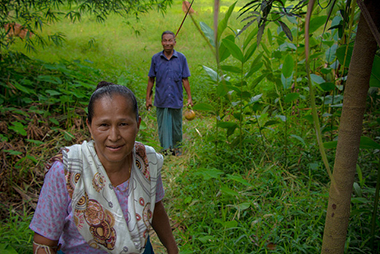The following blog by IFPRI gender experts Sophie Theis, Agnes Quisumbing, and Ruth Meinzen-Dick is the first in a four-part series leading up to the Policy Seminar on “Beijing +20 and Beyond: How Gender Research Is Changing the Landscape of Food Policy,” to be held on October 14, 2015 at IFPRI’s Washington, DC headquarters.
It’s been twenty years since the Beijing Declaration and Platform for Action launched an agenda for gender equality as a human right, a condition for social justice, and a “necessary and fundamental prerequisite for equality, development, and peace.” Beijing set its sights on removing all barriers for women’s equal participation in public and private spheres. The past twenty years have provided the opportunity for significant learning about how to do so, in a vast range of “spheres.”
In this context of looking back to look forward, we take stock of research at IFPRI over the past 20 years that contributed to advancing gender equality by generating evidence from action, and compelling action from the evidence produced. See full list of publications (PDF 94K).
In this blog series, we review key takeaways from the last 20 years of IFPRI gender research. This first blog of four explores two early themes of IFPRI gender research:
- unpacking the “black box” of household decision making
- understanding the impact of resources controlled by women
Tune in to the next post in the blog series to see how gender research at IFPRI has evolved since then, and join us on October 14th for an IFPRI policy seminar celebrating Beijing+20.
Most of the articles are published in peer-reviewed journals, but the hyperlinks provided go to the open access versions of the publications, except where noted with an asterisk.
Household decision making: unpacking the “black box”:
- Men and women within households do not make decisions “as one”; they do not always pool resources or have the same preferences. Therefore, it matters who within the household is targeted for development interventions (Haddad et al. 1997); increasing women’s control of resources is associated with better education, health, and nutrition outcomes for children (Quisumbing, ed. 2003). These findings from IFPRI’s gender research are used to draw out Implications for practitioners and policymakers across a wide range of programmatic areas in Quisumbing and McClafferty (2006).
- Across societies as diverse as Bangladesh, Ethiopia, Indonesia, and South Africa, assets at marriage influence men’s and women’s bargaining power within marriage. In Bangladesh and South Africa, women’s assets increase expenditure shares on education, while in Ethiopia, men’s assets have this effect (Quisumbing and Maluccio 2003)*.
- Bargaining power affects some, but not all, aspects of individual welfare within the household (Fafchamps, Kebede, Quisumbing 2009). In Ethiopia, the relative nutritional status of spouses is associated with differences in cognitive ability, independent income and asset devolution upon divorce. Women’s empowerment benefits child nutrition and education. All in all, bargaining power may be weakly associated with some aspects of intrahousehold welfare because surveyed households are poor and have little room for disagreement over consumption.
Human capital and resources controlled by women:
- An important example of evidence to action, in 1997 the Government of Mexico, drew on the findings from the intrahousehold literature that resources under women’s control are important for child welfare for the design and implementation of PROGRESA (now called Oportunidades). PROGRESA was a large, conditional cash transfer program targeting transfers to the mother within the household, conditional on children attending school and going to health clinics. A subsequent evaluation of PROGRESA showed the program increased enrollment rates in secondary education for girls and yields positive impacts on child health and nutrition, educational attainment, and lifetime earnings of the poor (Skoufias 2001).
- The findings of the evaluation of PROGRESA, in turn, influenced other countries to follow suit. In Conditional Cash Transfers in Latin America, Adato and Hoddinott (2010) analyze evidence from case studies of CCTs in Brazil, Honduras, Mexico, and Nicaragua, considering their costs, impacts on education, health, nutrition, and food consumption, and how CCT programs affect social and gender relations.
- Hallman (2003) finds that in Bangladesh, maternal and paternal shares of assets acquired before and during marriage have different impacts on boys’ and girls’ health. A higher share of current assets held by fathers reduces boys’ illness days, while a higher share of pre-wedding assets held by mothers’ reduces girls’ morbidity.







